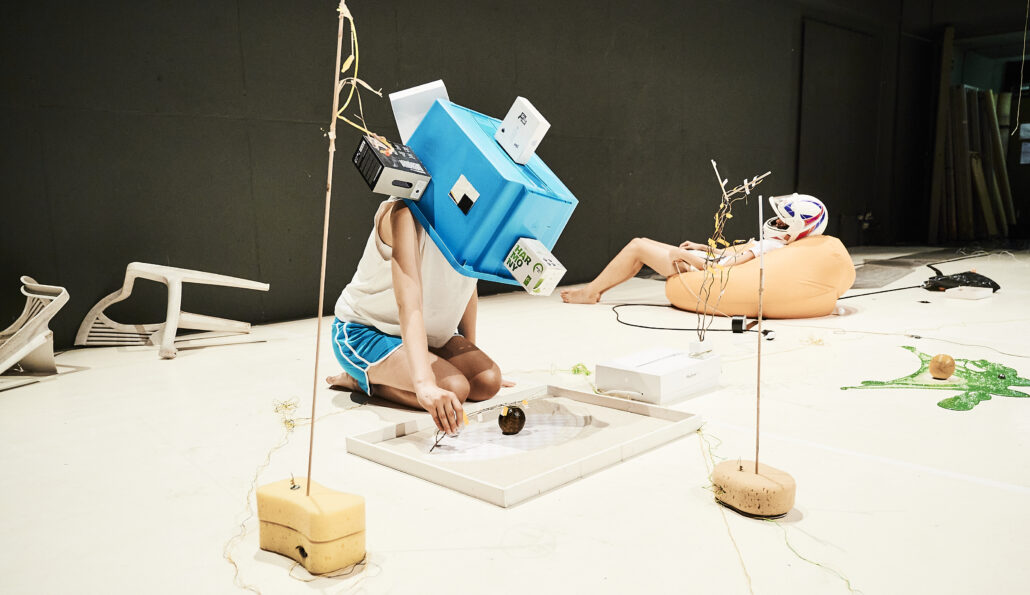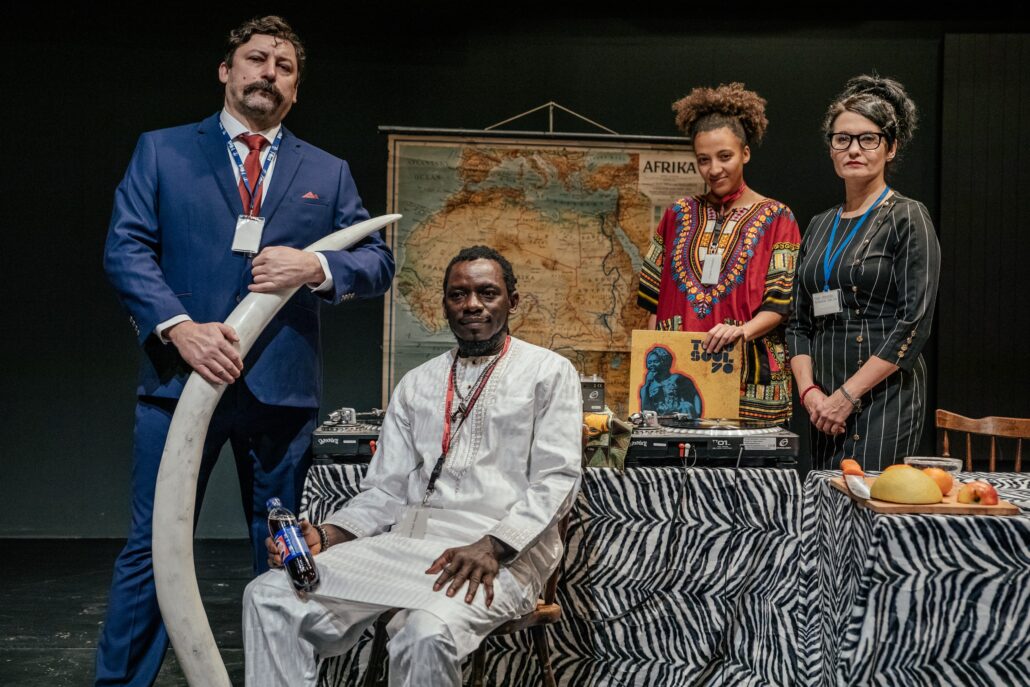Interdisciplinary Creation 2019-2023
The (Post)pandemic Search for Relationships in the World Outside
Despite all the human suffering, discomfort and long-term effects of the restrictions of recent years, it can be said the pandemic had a positive influence on Czech theatre as an impetus for development. At the same time, it also restored its social status as something rare – a unique way of communicating through art that is worth looking for in places that might seem unlikely at first glance. Such as in words, perhaps, or virtual reality or transformed robotic toys. Or maybe in the sphere of inflection points that can be painful to reflect on. These also include the post-anthropocentric perspective embedded in theatre-making with objects and intelligent technologies. The years influenced by anti-pandemic restrictions proved remarkable in that they saw this topic receive more and more sincere attention than ever before.
The state of emergency led anyone who engaged in theatre-making during the SARS-CoV-19 pandemic restrictions to experiment and navigate the borderlands and boundaries of theatre as an art rooted in immediate contact between the performer and the public. While an artist might have taken a more traditional approach prior to the pandemic crisis, suddenly they were occupied with devising various mediations and ways of transmitting theatrical means of expression into other media. Artists worked to create a shared presence with audiences through telephone conversations, mobile applications or a DIY-radio that passersby could tune in to, while staying both within sight and at an appropriately “non-infectious” distance from the artists and from each other. Artists from the Pomezí theatre association led the audience to investigate the Holešovice Market complex half in an embodied way and half with the assistance of an app on a tablet as if it was a game in a virtual environment. Cirk La Putyka’s initiative #kulturunezastavis (culture doesn’t stop) made a large number of intimate, yet medically sterile, artist visits to the homes of isolated seniors under the strictest of restrictions. Some actors told fairy tales on Facebook live streams, or communicated with the public through user commentary under streaming videos on YouTube. In short, the pandemic years compelled artists to look for immediacy and reciprocal communication in areas that theatre people generally view as nontraditional and marginalised. Audiences, too, were led to expand their skills of perception and cultivate a higher tolerance for various technologies or the need to engage the imagination to a degree beyond the usual audience participation demanded in the making of a theatre performance.

Embodiment, (luckily) captured in words
The concept for one of the works that most thoroughly engaged with the medium of text editor was created for the Brno platform Terén – Field for Performing Arts by Polish artist Wojtek Ziemilski under the title SEX.1 In mid-April 2021, with strict restrictions still in place, the work was presented for selected in-person participants. In tandem, Terén also offered a live stream to remote participants, who could switch between live shots from the House of Arts in Brno and shared Excel spreadsheets. The main event took place at the interface of these elements: 6 poets and writers transcribed their free associations on the topic of sex and intimacy. Thus a kind of improvised poem was created in rows and columns. Different encounters and intersections of individual texts and, by extension, their authors, within the dynamic fields of the table brought an element of theatricality into play. If an observer sitting at home behind their computer immersed themselves in the action, they could consider embodiment from wildly different perspectives: either in a rather passive way, as they read intimate messages in the wholly disembodied form of piecemeal spreadsheet entries, or actively, as they kept their fingers crossed for poets in live battles played out across adjacent excel boxes. It was also possible to examine the doings of the physically present audience peering over the shoulders of those writing at keyboards and monitors.
Displaying the spectator’s body to the gaze of others was a frequent motif in pandemic-era work and appears in the dance-oriented, international project Silent 2 which is still part of Temporary Collective’s repertoire. The co-creator and guide of the performance is dancer and choreographer Tereza Ondrová.
The action always takes place in her live presence. Each participant is given a set of headphones, through which six dancers from different parts of the world will later speak to them through audio recordings in English. The “audience” is given movement instructions: they dance at a distance from one another, collectively composing a choreography designed to unfold at the level of impulses to small movements of the mind (such as suggestions of where to focus one’s attention or what to imagine while performing various physically accessible movements). In a situation with limited opportunities to travel and meet one another, many cited feelings of freedom and intense sharing in their responses to the participatory performance, referencing, for example the dancers’ recorded comments on what they’d just observed where they had recorded the soundtrack and reflections on the situation of those who would later listen to their voices.

Object Theatre: a Post-pandemic Revival
In June 2021, the production Vzduch 3 (Air), by Tabula Rasa (Jan Brejcha, Jeník Tyl a Mikoláš Zika), a visual art-orientated ensemble that had previously flown largely under the radar, premiered at Prague’s Archa Theatre. It was the first work in a planned tetralogy, Elementum, focused on the elements. Tabula Rasa works with a DIY aesthetic and their feats have an extremely free structure. The objects on stage are given plenty of space and their materiality plays the leading role. In Air, there is plastic film, fans, and kites – in other words, objects that need a flow of air to reach their full potential. The artists frequently bring them to life in various rituals inspired by elements of Asian theatre, but their primary purpose is a celebration of airiness. In contrast to more established makers of object theatre productions, Tabula Rasa’s approach places greater emphasis on the objects themselves.
PYL, an international ensemble of women based in the Czech Republic, makes objects often literally found in the trash the centre of attention. Their work is also characterised by a huge emphasis on intuition and material. PYL describe their work as defined by “the artists’ strong focus on objects, their qualities and the potential expansion of their function and work with defects and damaged everyday objects or systems, but also the poetic construction of a spacious landscape of human bodies and things.” Their first post-Covid project, Reality Surfing 4, was created in co-production with two independent Prague theatres and a public theatre in Brno. The artists worked with modified robotic toys and home appliances capable of transmitting audio communication signals. These practices not only shifted the work into the borderlands of theatre and art installation, but also pushed it towards a concert of sounds. The distinctive performance style PYL applies in this production is also worth noting: there is something of a “scenographication” of the performers. They often pretend to be robotic devices, making inhuman sounds and sometimes hiding in the objects on display in a playful masking of their humanity.
The Emerging Topic of Decolonisation
Last but not least, it is worth mentioning that topics that have long dominated the cultural debate in Western Europe and the United States, but from which we have long averted our eyes, arrived in the Czech environment during and after the pandemic. Such topics included issues associated with decolonisation, which the Handa Gote ensemble was among the first to address in a specifically Czech context. Their production, Vzpomínky na Togoland 5 (Memories of Togaland) is a mockumentary about the times when Czechoslovakia had its own colony, Togo (in reality, Czechoslovakia never had a colony, nor was it ever suggested that, as a small country in the middle of Europe, it should have one). The artists ironically play with the Czech nation’s still unflagging sense of inferiority, as expressed in self-flagellating comments about how “the country lags behind the West in social development” and various references to the eternal “Czech smallness”. The character of “the good soldier Schweik” from the comedic novel by Jaroslav Hašek has become a world-famous, if ambivalent embodiment of this. The work also emerges from Czech society’s real colonial ambitions in the post-World War I period. Writer and explorer Jan Havlas was an active proponent of colonising Togo and he engaged the support of orientalist Alois Musil and explorer Emil Holub. From today’s perspective, their ideas appear naive and impossible to implement. Memories of Togaland shows what Czech reality would look like if these historical figures’ visions had become reality. The artists make somewhat blasphemous use of elements typical of documentary theatre, such as projections, readings from archival materials and the presence of everyday “experts”.
Theatre maker and visual artist Jan Mocek takes a different, more international approach to the theme in the project Present: Perfect. Performers Irina Andreeva, an actress of Russian background and an important representative of the Russian physical theatre school of the 1990s, and Tinka Avramova, an actor with roots from the United States and Bulgaria, lead the public through an exhibition of historical objects – indeterminate plaster casts to which many different identities can be attributed. In the first part of the performance, some audience members play visitors and have the performers explain the meanings of various objects, while the rest of the audience observes as if watching a piece of theatre. There is something provocative in the nature of the interpreters of history: one performer emphasises her Russian accent and, at times, her passionate temperament, while her counterpart – Avramova’s character – approaches the tensest moments with an affectedly positive mood that conceals a deep conviction that hers is the correct interpretation.
Not all of the guided interventions function as metaphorical links to the Cold War. At times, this dimension almost disappears, giving rise to a comfortable, uncritical state. The performance moves on from the presentation of fetishised objects said to have once belonged to sovereigns and supposedly represent their idealised personalities, to a denunciation of these objects as representatives of colonisation and other forms of oppression. As the artists describe their work, “Present: Perfect is a performance that examines iconoclastic gestures, which now relate to symbols of our own past as sources of our cultural identity.” The further the action progresses, the more opaque and emotionally charged a tangle of meanings emerges in a process analogous to the gradual stripping back of various layers of plaster. The audience gets the chance to experience a battle for the “correct” interpretation of reality in all of its charged and chaotic nature.
1 Wojtek Ziemilski: SEX, direction: Wojtek Ziemilski, Terén – Centre for Experimental Theatre,
premiere 19. 4. 2021, online stream from House of Arts, Brno.
2 Petra Tejnorová, Tereza Ondrová, Sodja Lotker: Silent, direction: Petra Tejnorová a coll.,
Temporary Collective, premiere 19. 9. 2021, Náměstí Václava Havla, Prague.
3 Creative team: Mikoláš Zika, Jan Brejcha, Barbora Burdová, Petr Slunečko, Jan Tyl, Šimon Janiček, Sára Pospíšilová: Vzduch, Tabula Rasa, premiéra 13. a 14. 7. 2021, Divadlo Archa, Prague.
4 Creative team: Světlana Silič, Maria Komarova, Anna Romanova, Theresa Schrezenmeir: Reality Surfing, PYL, premiere 7. 10. 2021, Alfred ve dvoře, Prague.
5 The following artists collaborated on the production: Havlová, Housková, Nwagbo, Švábová, Brejcha, Búřil, Dörner, Hybler, Chmelař, Jedinák, Jiřička, Jakeš, Ježek, Kopřiva, Krupanský, Kyšperský, Mennsdorf-Pouilly, Mikyska, Nyass, Poláková, Procházka, Procházka, Svatoš, Švejda, Tarnovski, Vitvar, Wajsar, Zika. Vzpomínky na Togoland, Handa Gote, Jedefrau, premiere 6. 9. 2021, Alfred ve dvoře, Prague.
categories
Interdisciplinary / Seasons’ overview
AUTHOR
Barbora Etlíková

 Learn
Learn







